10 Most Tourist Common Scams in India
- By Seema
India is unquestionably one of the most incredible places to visit in the world, and traveling there can be a life-changing experience. The country is known for its warmth and hospitality, and visitors are welcomed with open arms. Unfortunately, scamming is common in India, and there will always be a few touts or scammers looking to take advantage of unsuspecting travelers. From the moment you step out of the airport until you leave the country, you will come across swindlers looking to make an extra buck off tourists. India’s credibility and image have been wrecked by major fraudulent activities in the past.
Many tourists avoid India because of horrific stories about scams targeting tourists. Although dealing with these fraudsters can be extremely frustrating, keep in mind that scams happen all over the world. Be prepared and visit India with enough insight to identify and avoid the most common tourist scams. Here’s a rundown of some desi tourist scams in India.
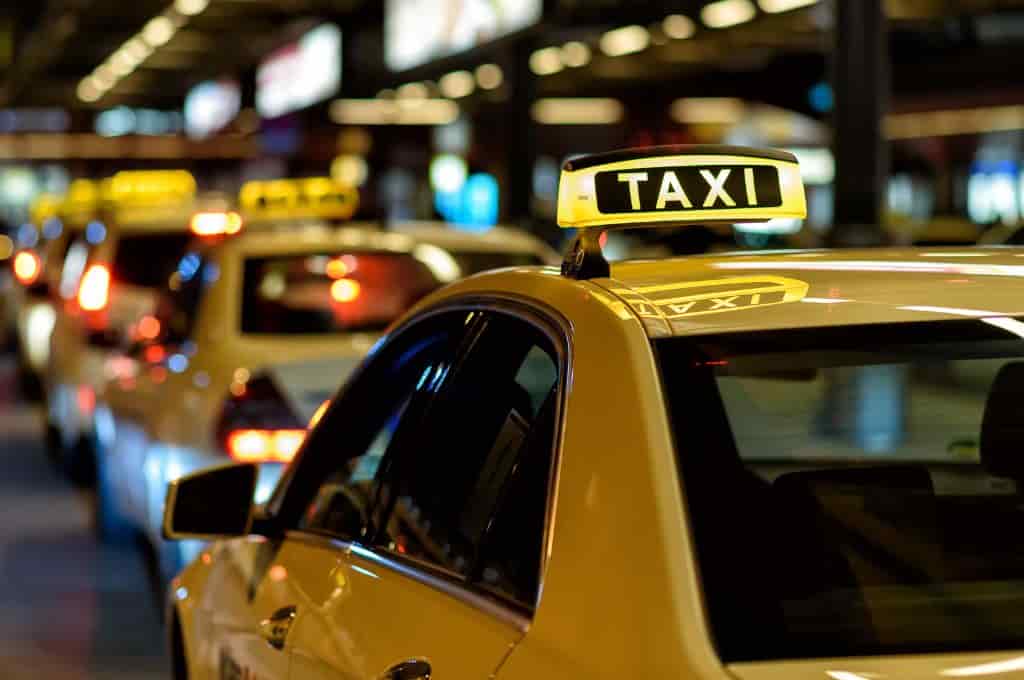
1) Inflated Taxi/Auto Fare
The majority of tourists complain about this scam, so be aware of it. Drivers can con you by charging exorbitant fares, claiming their meter is broken, taking you on longer routes, or tampering with their meters. When taking a taxi or auto, make sure the driver is using their meter, or negotiate the fare first and ensure that it includes all passengers and luggage. If the taxi driver claims the meter is broken but can still drive you for a low fare, do not fall for it.
Make sure you know where you are going and use Google Maps if you suspect the driver isn’t heading in the right direction. Do some research beforehand to get a rough estimate of the travel time and cost. Taking an unauthorized taxi can be dangerous, and you could get ripped off. Hire a cab from the hotel or another trustworthy source. Ride-sharing Apps like Ola and Uber are dependable and cost-effective, so use them wherever possible.

2) Money Scam
Isn’t it always about money? Currency scammers prey on oblivious tourists who are unfamiliar with the value, look, and feel of currency notes. Scammers may replace your genuine currency note with a counterfeit one when you try to get change for a larger bill or make a purchase. Or they might shortchange you in the hopes that you will not count the notes. If you point it out, they will claim you haven’t handed over enough. Counting the currency before exiting and providing exact change are effective ways to avoid currency scams.
3) Mandatory Donations
Donation scams are very prevalent in India, and many people fall victim to them. In India, places of worship are typically free, though there may be a small fee for carrying a camera or storing your footwear. There is no obligation to make any donation. However, people will often approach you and ask for a donation. They pretend to be representatives of charitable institutions and solicit large donations. To avoid such schemes, request licenses and check the official rules and regulations.
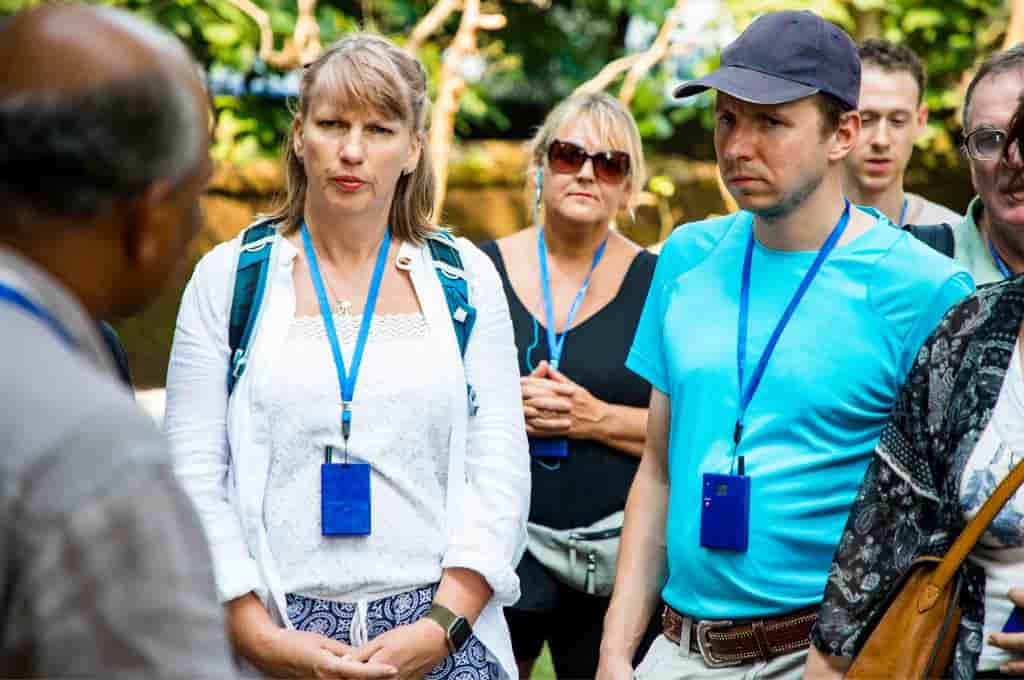
4) Guide Scam
Guide scams are most common at historical and religious sites. Scammers posing as tour guides lurk at tourist attractions, primarily targeting foreign tourists. They approach travelers, offering their services at inflated rates. These ‘guides’ may lack the expertise and credentials to provide a genuine and in-depth experience. They often exploit tourists by bringing them to extravagantly priced stores or restaurants, where they get paid a commission on each transaction. To avoid becoming a victim of this scam, hire a licensed guide who is available at the ticket counter. If you decide to hire a guide elsewhere, make sure they have the necessary credentials and licenses, and agree on a price upfront.
5) Beggar Scam
This is the most prevalent and most extensive racket in India, and it can sometimes involve the entire family working together. Children may approach you with bandages wrapped around different parts of their bodies. All of the bandages are fake and are deployed to elicit sympathy from onlookers. You might be asked to buy milk for a baby or pens for homeless kids. They then conveniently show you where to buy the products, which will be available at a significantly inflated price. The scammers have naturally made a deal with the shopkeeper, and all of these items will be returned to the store for cash once you leave.
Visitors must avoid feeling pressured and becoming victims of emotional blackmail. Additionally, giving money to beggars in public is risky because it triggers a stampede of beggars from every direction. While it can be depressing to observe the conditions of homeless and destitute children on the streets, it would be better to use the funds to support organizations that assist those in need.
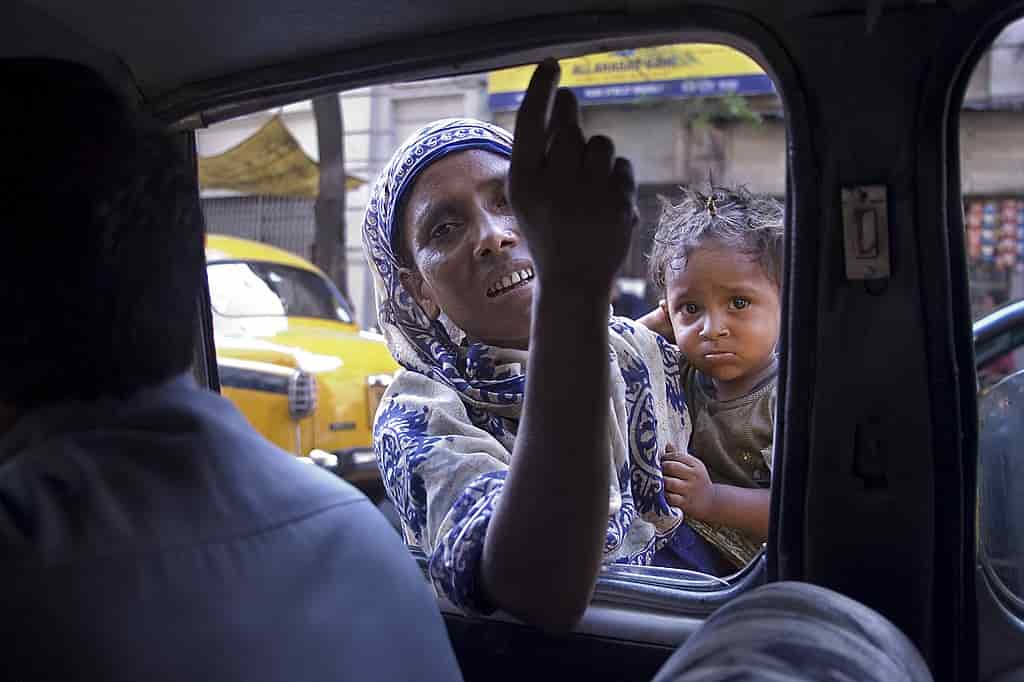
6). Pick Pocketing and Bag Snatching
Pickpockets and thieves frequent crowded areas such as markets, train stations, bus stops, and tourist attractions. The thieves work in teams and employ distracting techniques to get hold of your money. One will try to divert your attention, while his accomplice will steal your valuables the moment you’re distracted. A popular trick is to exit the metro just as the doors are closing, snatching the purse of someone studying near the door. Tourists should exercise caution and keep a close eye on their belongings. Follow the required safety measures, such as keeping your wallet in your front pocket or in a well-covered bag, distributing the cash in various places to reduce the damage, and being attentive when someone bumps into you.
7. The Hotel Switch
This scam is most commonly targeted at tourists arriving at the airport and taking a pre-paid taxi to their hotel. On the way to your preferred hotel, the cab driver will inform you that it is closed, full, or not good. He may even claim he doesn’t know where your hotel is, or that the roads leading to it are closed due to political or religious gatherings. The fraudster will offer to take you to another hotel or travel agent, where he will earn a commission. The recommended hotel will usually be more expensive or of inferior quality.
If the hotel of your choice is popular, there is a good chance another hotel with a similar or even identical name is nearby. The taxi driver may attempt to take you to a similar-sounding hotel. To ensure availability and prevent misunderstandings, reservations should be confirmed directly with the hotel before travel. The most effective method to avoid this scam is to schedule an airport pickup from your hotel. Utilize the GPS to trace the path if you know the address of your accommodation. Also, keep their phone number handy in case you need help with getting directions.

8) Counterfeit Goods
India is a shopper’s paradise, famous for its extensive collection of antique jewelry, textiles, clothing, gems, leather goods, and handicrafts. Unfortunately, there is an abundance of counterfeit and cheap replicas of everything imaginable, including watches, designer purses, branded clothing, pashmina, electronics, sunglasses, phones, belts, and so on. Fake products closely replicate popular brand-name items. Before making any purchases, you must do research and obtain a general idea of market prices. Avoid falling victim to counterfeit fraud by inspecting the quality and authenticity of everything you buy. It is best to steer clear of anything being sold for unusually low prices. If something appears too good to be true, it usually isn’t.
9) Train Scam
India’s railway system can be baffling for first-time visitors, and scammers frequently take advantage of this. Standard scams include claims that your train has been canceled, that you need a special pass, that the train is fully booked, that your ticket needs to be stamped, or that they can guarantee you a seat. Another common ploy that often works is for someone to stand outside the train station and claim the ticket office has moved or is closed, pressuring you to buy a ticket from their shop. They claim to be government-approved, but in most cases, they will sell you counterfeit tickets or charge you excessive fees. It is recommended that you buy tickets directly through the official Indian Railway website, or use a hotel concierge service or an authorized travel agency.
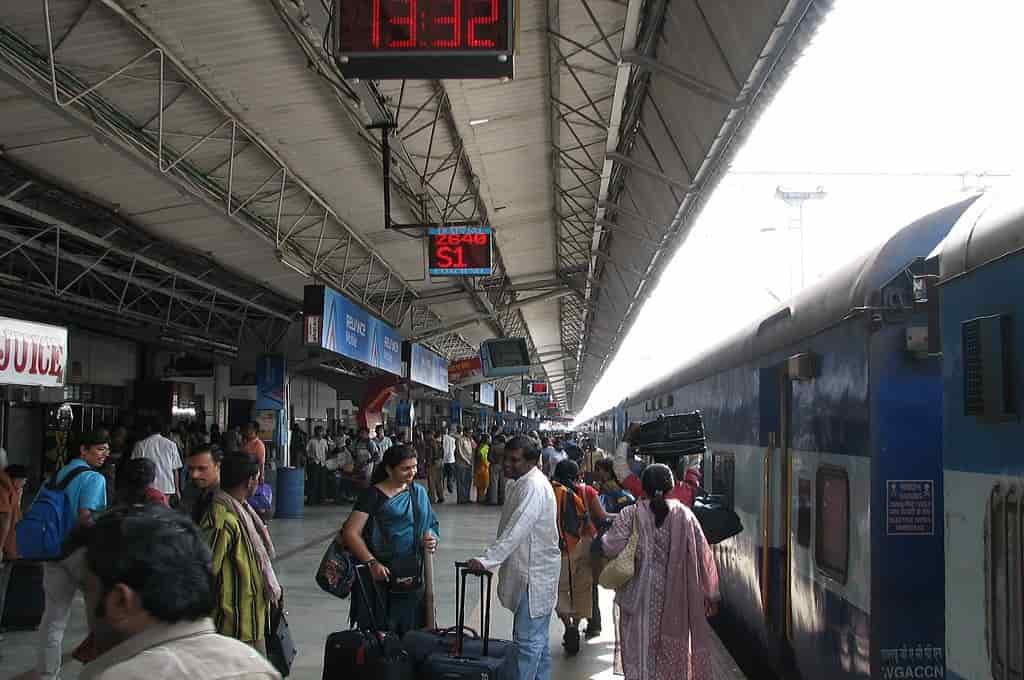
10) SIM Cards Scam
To purchase a SIM card in India, you will need quite a bit of paperwork, ID proof, and a passport-size photograph. If you skip these steps and buy a cheap SIM card from an unofficial vendor, you are likely to receive an old, expired, inactive, or overpriced SIM card. This means you’ll either get calls all day from random numbers, it won’t start at all, or it will simply shut down when it isn’t verified. To avoid any hassles, it is prudent to visit the registered office of the service provider, complete the necessary paperwork, and obtain a valid SIM card.
Wait, There are More….
- Some crooks may be overly friendly and recommend places to visit or shop. In most cases, they get commissions from the businesses and suppliers they suggest.
- Shopkeepers, particularly street vendors and local shops, will quote outrageous rates as soon as they see you are a Westerner. The simplest way to avoid this is to buy at reputable fixed-price shops or know the rough cost of the items you are purchasing so that you can bargain hard.
- Be extremely cautious when passing your belongings through scanning machines at railway stations. The stations are so crowded that it is very easy for someone to walk away with your luggage.
- Hackers frequently access unprotected networks and public Wi-Fi to obtain personal data, including credit card numbers and passwords. Refrain from using public Wi-Fi to access sensitive data.
- A child or so-called “holy man” will bind a red thread around your wrist or place a red dot on your forehead and then ask for money. It is impossible to get out of this scenario without giving a few bucks.
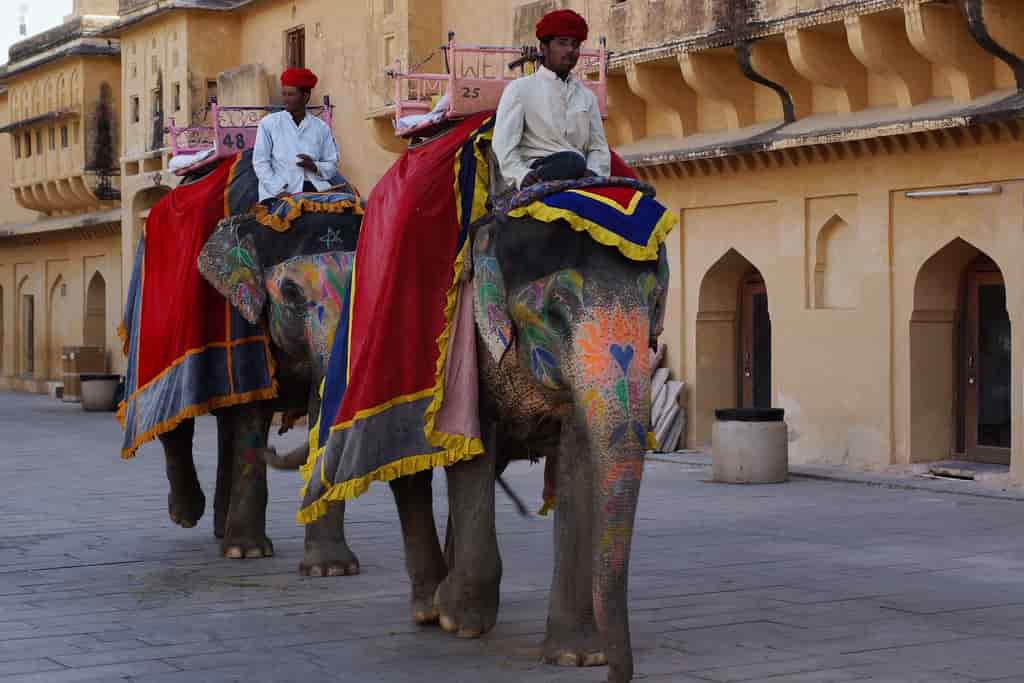
- If you photograph a dressed-up elephant, cow, or camel, be prepared to shell out a tip – unless you want to create a scene.
- There have been numerous reports of people offering food or beverages laced with drugs that would put you to sleep. When you wake up, your bags will be gone. Be cautious about what you buy on trains, and say “no” if you are unsure about the food provided.
- This scam can be extremely dangerous to your health. Shopkeepers fill empty mineral water bottles with tap water before gluing the lid back on. This is why it’s crucial that you closely inspect the seal of the bottled water before making a purchase.
- You notice that your bill includes additional food and drinks. When you point out the error, it will be promptly corrected, but the service charge—which was computed using the earlier inflated amount—will stay. It is best to obtain a completely new bill that accurately reflects the amount and service charge.
- When you get to the airport, many people will come up to help you with your bags, and they will insist that you don’t have to pay them for their assistance. Do not fall into this trap. They won’t budge until you pay them, and that too in dollars.
The list is long, but it is far from complete. Scammers are becoming more manipulative and shrewd as they gain increased exposure and access to endless resources, and new scams continue to surface. However, this should not discourage you from traveling. You can see right through most of them if you are watchful, cautious, and smart.
